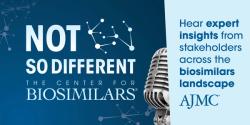© 2026 MJH Life Sciences™ and The Center for Biosimilars - Biosimilars, Health Economics & Insights. All rights reserved.
Gary Lyman, MD, MPH: Challenges With Incorporating Biosimilars Into Cancer Care
Gary Lyman, MD, MPH, of the Fred Hutchinson Cancer Research Center and Seattle Cancer Care Alliance, describes challenges with incorporating biosimilars into cancer care.
Transcript
I think the challenges, I look at them as 2 levels: one is for the provider and to some extent the patient, and that is skepticism. These are approved by a different process, different mechanism. We’re used to seeing these large phase 3 trials demonstrating efficacy and safety, and we're not seeing that with these, so there’s a skepticism, and many not wanting to be the first physician in their group to use a new agent when they've gotten very comfortable with the original biologics approved 20 years ago.
So I think there we need more education. [The American Society of Clinical Oncology, ASCO] has had a major effort that I had an opportunity to work with. We published some educational guidance in the Journal of Clinical Oncology 2 years ago. We’re putting on educational programs at the annual meeting, the same at the American Society of Hematology, and now here at [National Comprehensive Cancer Network, NCCN], so I think education about what a biosimilar is, what's the process, how it’s different, and why we should even rely on it, so that's very important
There's also some skepticism about how much of an impact on cost these agents will have and whether it really will bring down the incredibly high cost and rising cost of cancer care delivery in the United States.
It's not the whole solution, but I personally think it's a piece of the solution. We need other things at the policy level to rein in healthcare costs, but I think by biosimilar competition and reduced pricing can really help.



